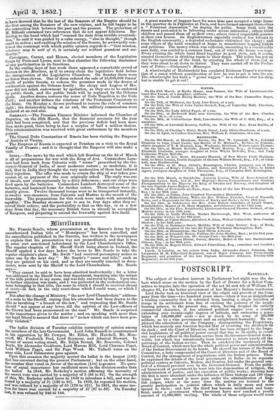33liortilattruns.
Mr. Francis Searle, whim presentation at the Queen's levee by the unauthorized Italian title of Monsignore" has been cancelled, and The cancellation published in the Gazette, has written to the newspapers to explain that his presentation was not premeditated, and that it was in some sort sanctioned beforehand by the Lord Chamberlain's Office. The regular chaplain of Mr. Sheriff Swift being absent in Ireland, the Sheriff applied a few days before the levee to Mr. Searle to take the regular chaplain's place. Mr. Swift "had received peremptory notice to -name one by the next day." Mr. Searle's "name and title,' such as They are printed on his card, and as they are usually inserted in docu- ments, were sent by the Sheriff to the Lord Chamberlain. Mr. Searle says- " They cannot be said to have been admitted inadvertently ; for a letter was addressed to the Sheriff from that department, inquiring into the nature of the title prefixed to my name, and was duly answered by him. Upon this no further objection was made, and I was presented in the ecclesiastical cos- tume belonging to thaftitle, the same in which I should be received abroad at court—in fact, in the only court-dress which I could wear, or which I possess."
But after the change of Ministry, "the new Lord Chamberlain" address- ed a note to the Sheriffi stating that his attention had been drawn to the title as involving " a breach of the law," and requesting that Mr. Searle should "not appear at any levee, till the opinion of the Law-officers of the Crown had been pronounced on the case." Mr. Searle is surprised at the importance given to the matter ; and on speaking with more than one legal friend is assured that there is " no law which can have been pos- sibly violated."
The ballot division of Tuesday exhibits contrariety of opinion among the members of the late Government. Lord John Russell is countenanced fit his opposition by Mr. Cowper Mr. Elliot, Mr. Hatchell, Mr. Mon- 'aid'', Mr. Frederick Peel, Lord Seymour, and Admiral Stewart. In favour of secret voting stand, Mr. Ralph Bernal, Mr. Bouverie, Colonel Boyle, Sir Alexander Cockburn, Lord Marcus Hill, Lord Clarence Paget, Lord William Paget, and Sir Page Wood. Mr. Tufnell votes on the same side, Lord Palmerston goes against.
Upon this occasion the majority against the ballot is the largest (102) that has occurred during the present Parliament ; but on the other hand, the number that voted in favour of the motion (144) is greater. No ques- tion of equal importance has oscillated more in the division-scales than the ballot. In 1848, Mr. Berkeley's motion affirming the necessity of the secret vote was carried by a majority of 5 (86 to 81). On the strength of this, Mr. Berkeley asked leave in 1849 to introduce a bill, and was de- feated by a majority of 51 (136 to 85). In 1860, he repeated his motion, and was refused by a majority of 55 (176 to 121). In 1861, the same mo- tion for leave was carried by a majority of 37 (87 to 50). On Tuesday last, it was refused by 246 to 144. A great number of beggars have for some time past occupied a large house in the quartier de la Pepiniere at Paris, and have formed amongst themselves a " Fraternal Association" for duping the public. Some went into the streets and pretended to be labouring under severe infirniities ; others hired children and passed them off as their own ; others visited respectable persons at their own houses. An Englishwoman especially confined her labours to the English community ; a degraded ecclesiastic victimized the clergy ; and some others of the band remained at home to manufacture begging letters and petitions. The money which was collected, amounting to a considerable sum daily, was carried to a common fund, out of which the house was kept. Every evening the whole band dined together in good style, and, it seems, amused themselves in drinking toasts to their dupes. The police has put an end to the operations of the band, by arresting the whole of them just as they were about to sit down to dinner. They were carried off to the Prefec- ture of Police.—Galignanis Messenger.
A wheelwright of Huddersfield has emulated Robinson Crusee's construc- tion of a canoe without consideration of how he was to get it into the Sea. The wheelwright has built a "grand waggon" in a chamber over his shop, but is unable to get it out !


























 Previous page
Previous page